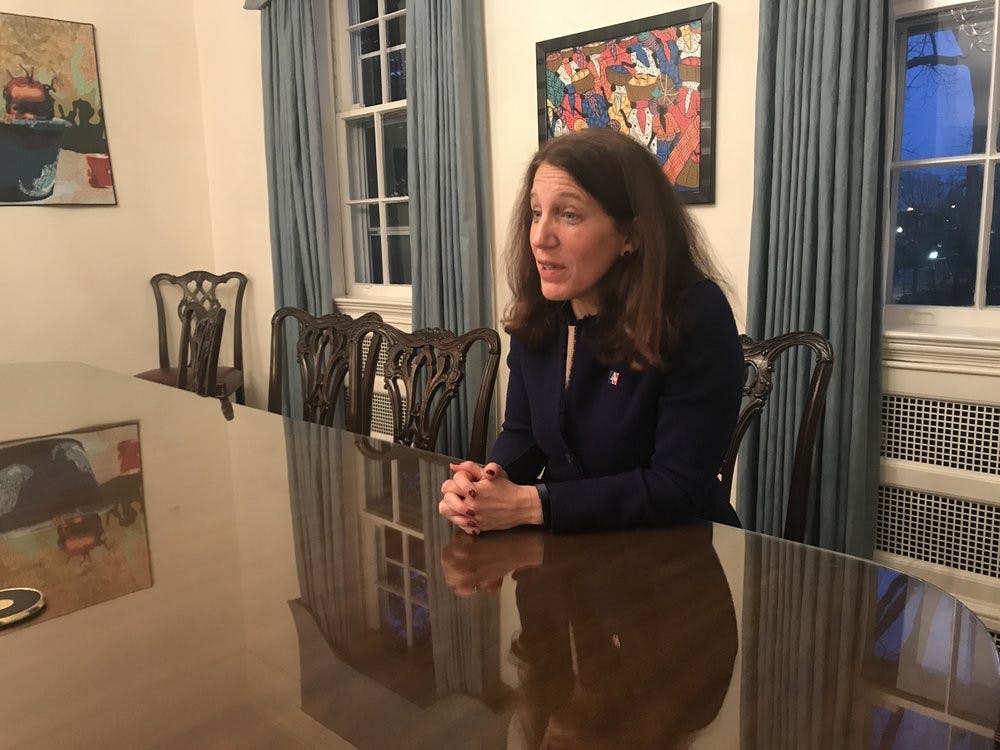BY: LAUREN LUMPKIN

On Tuesday, American University introduced its Plan for Inclusive Excellence, a 25-page document detailing how the university will tackle issues surrounding diversity and inclusion.
"American University can thrive only when we affirm the dignity of everyone, when we demonstrate cultural competence, and when all members of our community – especially students, faculty, and staff of color— feel included," President Burwell said in a statement.
Only 33 percent of African American students said they feel included at AU, compared to 71 percent of white students, according to data from the 2017 Campus Climate survey.
The two-year plan consists of five goals: training, learning and development; campus climate, culture and community; systems, policies and procedures; access and equity; and curriculum and instruction.
Each goal includes several action steps, like bolstering affinity-based mentoring programs and providing grants for interdisciplinary projects.
The new plan has been molded by the inclusive excellence framework, an integrated approach to making the university more inclusive at all levels.
"[Inclusive excellence] is working across all the issues, and that means you work across all elements of our community," said Burwell in an interview with The Blackprint. "Whether it's compositional diversity, curriculum, cultural issues, policies and produces, education and learning - because sometimes you can do pieces of one, but you won't get what you want."
"These things, they intersect all the time," added Vice President of Campus Life Dr. Fanta Aw.
There's also "the why," says Burwell.
"It's part of our values. I think we also need to recognize it is part of excellence. That's why it's called inclusive excellence," the president said. "If you do not have and are not practicing the ideas of inclusivity, diversity and equity, I believe that, as an academic institution, we are not doing what is our role, we are not teaching critical thinking. You have to have those differing inputs, differing points of view, different identities, different approaches that diversity brings to us as a campus."
AU will allocate $121 million over next two years to fund diversity and inclusion-related initiatives, according to the plan. In fiscal year 2018, $53 million will be used for institutional scholarships, like the Frederick Douglass Distinguished Scholars and Veterans' Yellow Ribbon programs. The leftover $7 million will be used to continue to fund academic initiatives like faculty development and the year-long AUx program all first-year students will be required to take starting fall 2018.
The university expects to spend another $61 million during fiscal year 2019.
The Plan for Inclusive Excellence comes after former AU President Neil Kerwin's five-point plan that was introduced in February 2016. Burwell said she believes this plan is just another step in the journey to becoming a more diverse and inclusive university.
The plan does not come without concerns, though. Burwell said she knows university leadership has not always done a great job at communicating with students about these issues.
"This is an area that we've been working on, even before the plan, how we communicate" said Burwell. Section three of the plan, "Systems, Policies and Procedures" includes a university-wide communications plan Burwell says will be "more rigorous."
Since her tenure began in June, Burwell has been working to change the culture at AU. She said she's spent the last seven months speaking to more than 1,000 students, faculty and staff - including 19 student groups.
Burwell said she doesn't expect this to come without backlash. After anti-immigration stickers were posted on campus just two weeks into this semester, Burwell said in a statement AU is a target for acts of hate.
"Of course I am interested in the safety of our community...but I think Dr. Kendi said it appropriately, ‘We can't let them fear us down," said Burwell.
"It's who we are. We're not doing it as well as we should, but I think part of the reason these incidents occur is because, from the outside world perspective, I think that's a part of what people think about us, that we are a community that values these things."
Lauren Lumpkin is member of the President's Council on Diversity and Inclusion.


